2022年中考英语辨析系列 (3)代词易错点精析
文档属性
| 名称 | 2022年中考英语辨析系列 (3)代词易错点精析 | 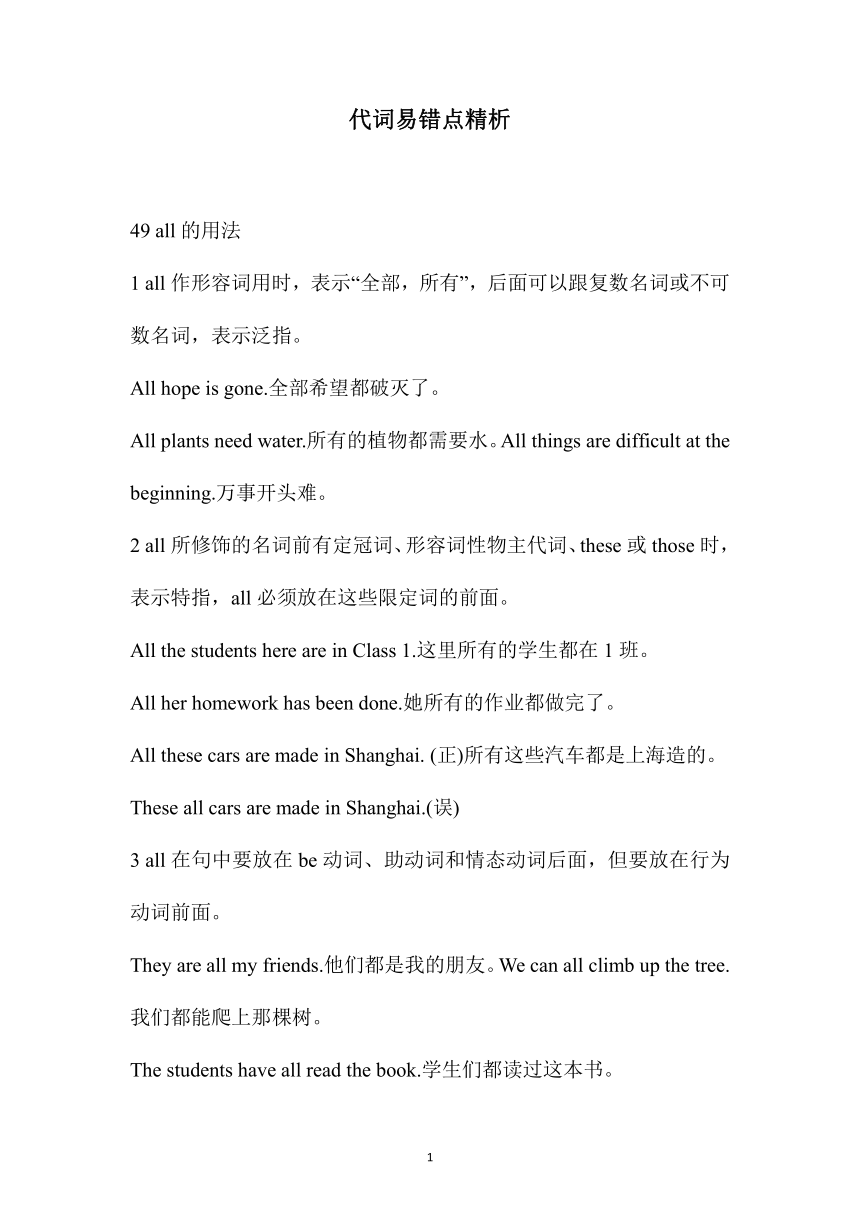 | |
| 格式 | docx | ||
| 文件大小 | 30.9KB | ||
| 资源类型 | 教案 | ||
| 版本资源 | 通用版 | ||
| 科目 | 英语 | ||
| 更新时间 | 2022-02-28 21:00:13 | ||
图片预览

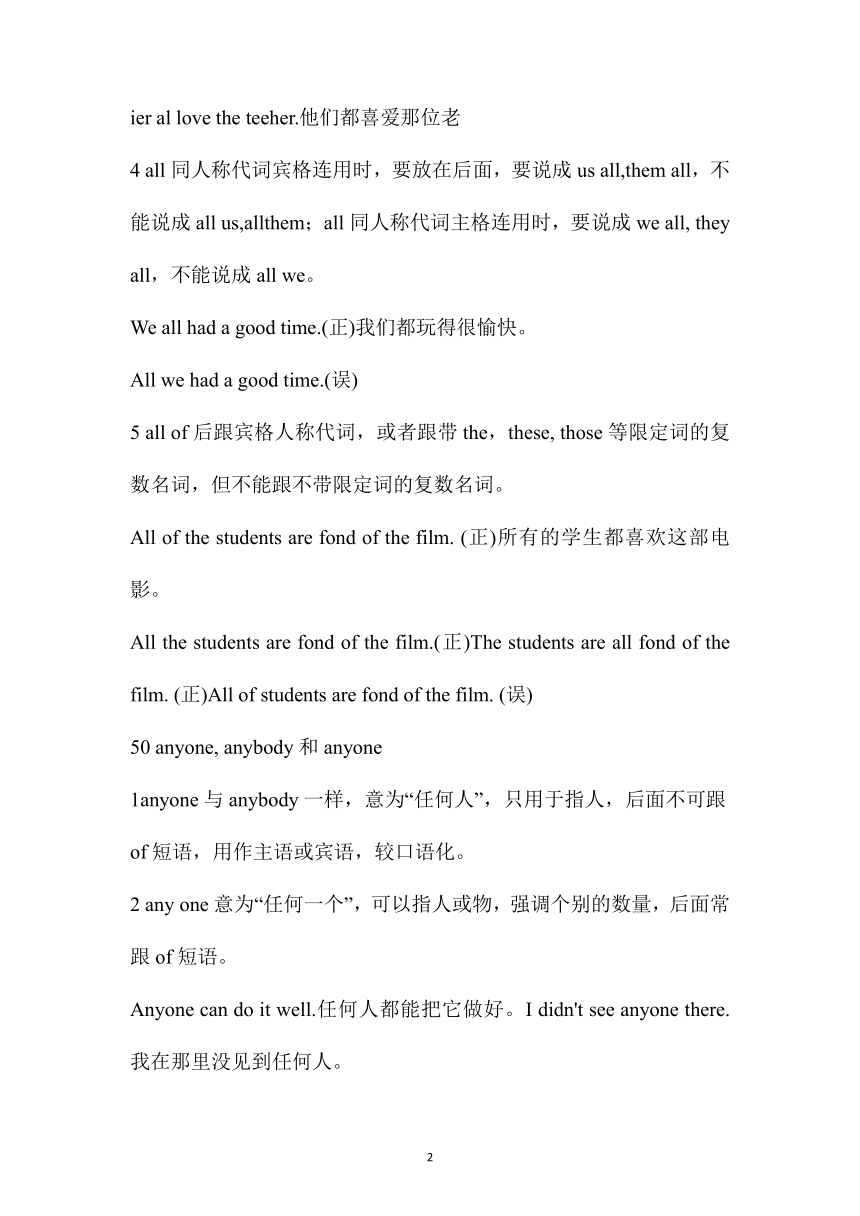
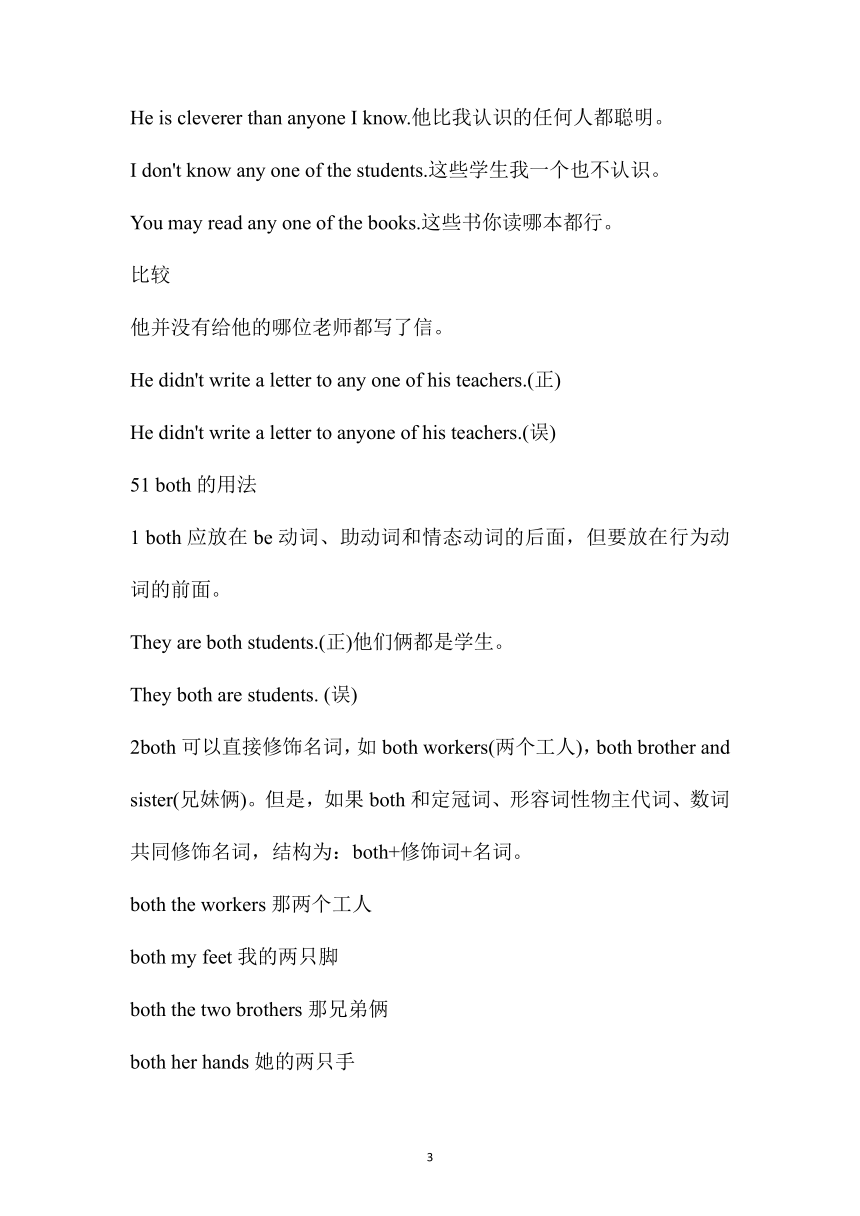
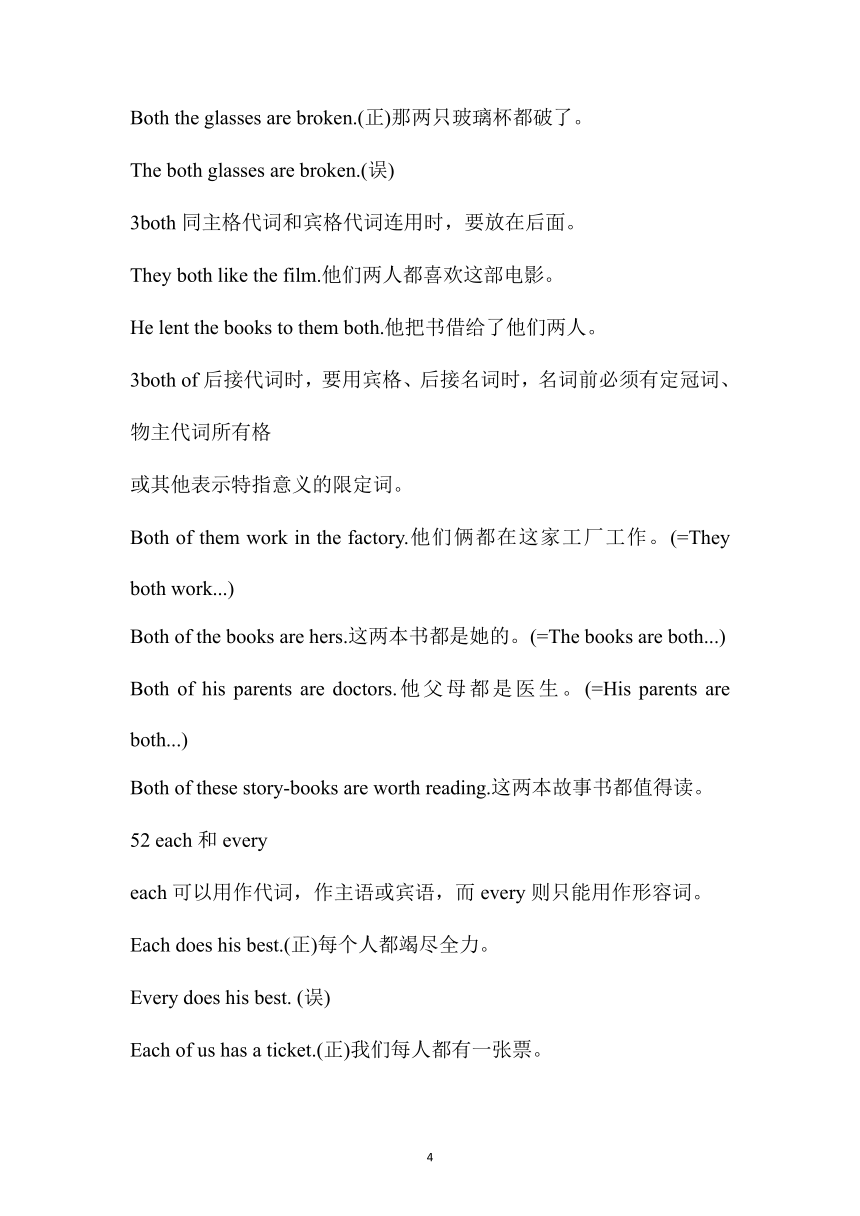
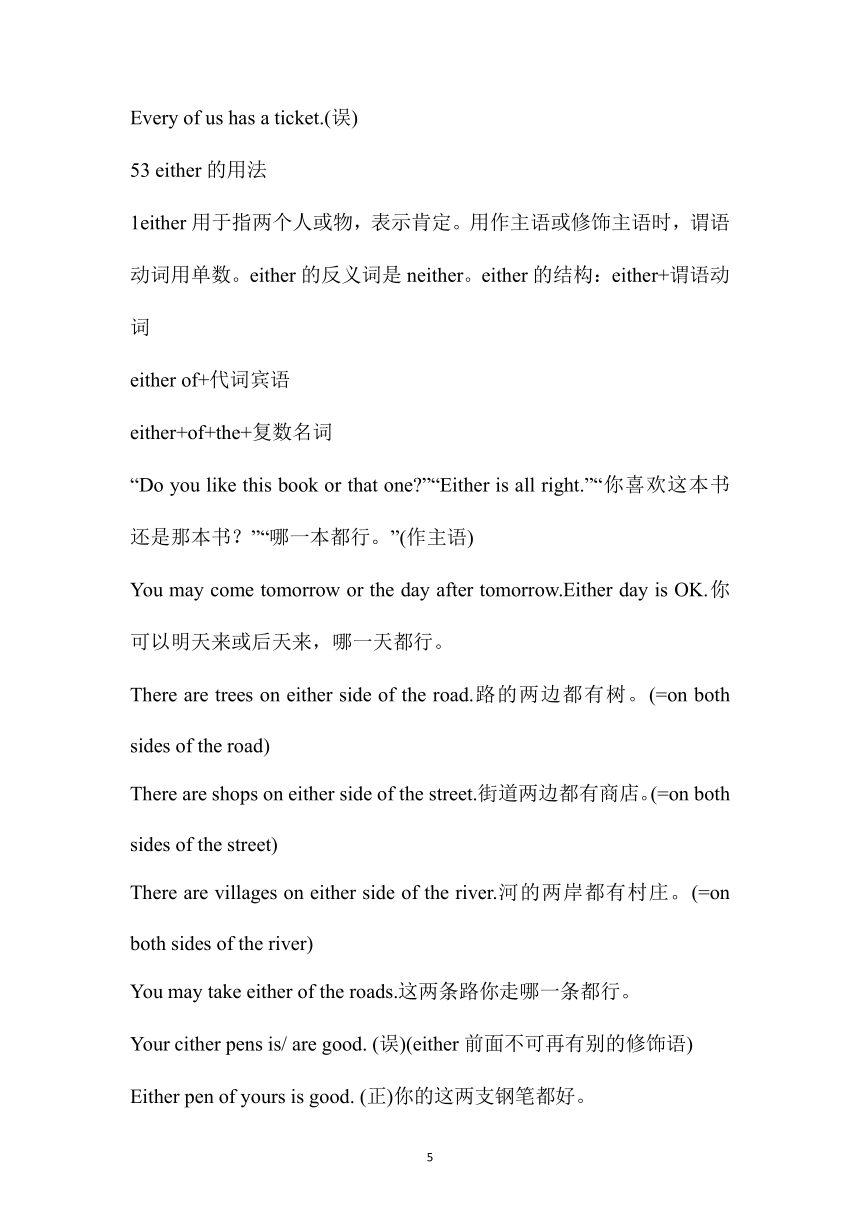
文档简介
代词易错点精析
49 all的用法
1 all作形容词用时,表示“全部,所有”,后面可以跟复数名词或不可数名词,表示泛指。
All hope is gone.全部希望都破灭了。
All plants need water.所有的植物都需要水。All things are difficult at the beginning.万事开头难。
2 all所修饰的名词前有定冠词、形容词性物主代词、these或those时,表示特指,all必须放在这些限定词的前面。
All the students here are in Class 1.这里所有的学生都在1班。
All her homework has been done.她所有的作业都做完了。
All these cars are made in Shanghai. (正)所有这些汽车都是上海造的。
These all cars are made in Shanghai.(误)
3 all在句中要放在be动词、助动词和情态动词后面,但要放在行为动词前面。
They are all my friends.他们都是我的朋友。We can all climb up the tree.我们都能爬上那棵树。
The students have all read the book.学生们都读过这本书。
ier al love the teeher.他们都喜爱那位老
4 all同人称代词宾格连用时,要放在后面,要说成us all,them all,不能说成all us,allthem;all同人称代词主格连用时,要说成we all, they all,不能说成all we。
We all had a good time.(正)我们都玩得很愉快。
All we had a good time.(误)
5 all of后跟宾格人称代词,或者跟带the,these, those等限定词的复数名词,但不能跟不带限定词的复数名词。
All of the students are fond of the film. (正)所有的学生都喜欢这部电影。
All the students are fond of the film.(正)The students are all fond of the film. (正)All of students are fond of the film. (误)
50 anyone, anybody和anyone
1anyone与anybody一样,意为“任何人”,只用于指人,后面不可跟of短语,用作主语或宾语,较口语化。
2 any one意为“任何一个”,可以指人或物,强调个别的数量,后面常跟of短语。
Anyone can do it well.任何人都能把它做好。I didn't see anyone there.我在那里没见到任何人。
He is cleverer than anyone I know.他比我认识的任何人都聪明。
I don't know any one of the students.这些学生我一个也不认识。
You may read any one of the books.这些书你读哪本都行。
比较
他并没有给他的哪位老师都写了信。
He didn't write a letter to any one of his teachers.(正)
He didn't write a letter to anyone of his teachers.(误)
51 both的用法
1 both应放在be动词、助动词和情态动词的后面,但要放在行为动词的前面。
They are both students.(正)他们俩都是学生。
They both are students. (误)
2both可以直接修饰名词,如both workers(两个工人),both brother and sister(兄妹俩)。但是,如果both和定冠词、形容词性物主代词、数词共同修饰名词,结构为:both+修饰词+名词。
both the workers那两个工人
both my feet我的两只脚
both the two brothers那兄弟俩
both her hands她的两只手
Both the glasses are broken.(正)那两只玻璃杯都破了。
The both glasses are broken.(误)
3both同主格代词和宾格代词连用时,要放在后面。
They both like the film.他们两人都喜欢这部电影。
He lent the books to them both.他把书借给了他们两人。
3both of后接代词时,要用宾格、后接名词时,名词前必须有定冠词、物主代词所有格
或其他表示特指意义的限定词。
Both of them work in the factory.他们俩都在这家工厂工作。(=They both work...)
Both of the books are hers.这两本书都是她的。(=The books are both...)
Both of his parents are doctors.他父母都是医生。(=His parents are both...)
Both of these story-books are worth reading.这两本故事书都值得读。
52 each和every
each可以用作代词,作主语或宾语,而every则只能用作形容词。
Each does his best.(正)每个人都竭尽全力。
Every does his best. (误)
Each of us has a ticket.(正)我们每人都有一张票。
Every of us has a ticket.(误)
53 either的用法
1either用于指两个人或物,表示肯定。用作主语或修饰主语时,谓语动词用单数。either的反义词是neither。either的结构:either+谓语动词
either of+代词宾语
either+of+the+复数名词
“Do you like this book or that one ”“Either is all right.”“你喜欢这本书还是那本书?”“哪一本都行。”(作主语)
You may come tomorrow or the day after tomorrow.Either day is OK.你可以明天来或后天来,哪一天都行。
There are trees on either side of the road.路的两边都有树。(=on both sides of the road)
There are shops on either side of the street.街道两边都有商店。(=on both sides of the street)
There are villages on either side of the river.河的两岸都有村庄。(=on both sides of the river)
You may take either of the roads.这两条路你走哪一条都行。
Your cither pens is/ are good. (误)(either前面不可再有别的修饰语)
Either pen of yours is good. (正)你的这两支钢笔都好。
2either用作连词,构成either...or..结构,连
语动词要同or后的成分保持一致。
Either you or he is right.不是你对,就是他对。/要么你对,要么他对。(连接主语)Do you know either English or French 你懂英语还是懂法语?(连接宾语)
You may come either on Sunday or on Friday.
你可以星期天来,或者星期五来。(连接状语)
You may either take a bus or go there on foot.你要么乘汽车,要么步行去那里。(连接谓语)
Either Mr. Zhang or his students are coming.不是张先生来,就是他的学生们来。
Either his students or Mr. Zhang is coming.不是他的学生们来,就是张先生来。
提示
①neither表示“两者中没有一个”,谓语动词用单数。
Neither pen is his.两支钢笔都不是他的。②both表示“两者都”,谓语动词用复数。Both of them are blue.两个都是蓝色的。
54 everyday是否等于everyday
1everyday是一个词,为形容词,意为“每天的,日常的”,只能作定语。
everyday English日常英语
everyday practice每天的练习
2 every day是两个词,为副词短语,意为
“每天”,用作状语。
She takes a walk every day.她每天散步。
比较
Does it rain here everyday (误)
Does it rain here every day (正)这里每天都下雨吗?
55 everyone不完全等于everyone
1everyone相当于everybody,是一个词,意为“大家,每人”,指人,强调整体,为代词;every one是every修饰one,是两个词,意为“每人,每一个/件”,可以指人或物。everyone和every one指人时有时可换用。Everyone/Every one in the class passed theexam.班上人人都通过了考试。
2every one后可跟of短语,表示“……中的
以。
She put every one of the tea cups on the table.她把茶杯一只一只地放在桌子上。(指物)He gave a book to every one of them.(正)他给了他们每人一本书。(指人)
He gave a book to everyone of them.(误)
She has tried every one of the pens. (正)这些钢笔她每一支都试过。
She has tried everyone of the pens.(误)
56 not everyone——部分否定怎样表示
everyone意为“每个人”,为代词。
(1)它的肯定句为:
Everyone can do it.每个人都能做这件事。
(2)它的否定式有两种形式:
Everyone can not do it.
Not everyone can do it.
(3)但是,上面两句并不是表示“每个人都不能做这件事。”而是表示“并不是每个人都能做这件事。”也就是说:一部分人能做,一部分人不能做。这就叫做“部分否定”。Everyone can do it.的全部否定应是:No one/ Nobody can do it.没有人能做这件事。
(4)比较下面的部分否定和全部否定:
Everybody likes the book.每个人都喜欢这本书。Not everybody likes the book.不见得每个人都喜欢这本书。(部分否定)
No one likes the book.没有人喜欢这本书。(全部否定)
Every one of us is worried about her.我们每个人都为她担忧。
No every one of us is worried about her.并非我们每个人都为她担忧。(部分否定)
None of us is worried about her.我们谁也不为她担忧。(全部否定)
Everything is useful.一切东西都是有用的。Everything is not useful.并非一切东西都有用。(部分否定)
Nothing is useful.没有任何东西是有用的。(全部否定)
57 everything和every thing
everything是一个词,为代词,意为“每件事,每样东西”。但every thing是every(每个,各个)修饰thing,意为“各个东西,不同的事”。
Everything here is useful,but not every thing is cheap enough.这里的样样东西都是有用的,但并不是每件东西都很便宜。
Everything goes well with her. (正)她一切顺利。
Every thing goes well with her. (误)
58 it能否指婴孩
it一般用来指物,但也可以指婴孩、男婴(a baby boy)和女婴(a baby girl)都可以用it指代。
Is it a boy or a girl 是男孩还是女孩?
She had a baby last night. Is it a boy 她昨晚生了一个婴儿,是男孩吗
A: Who is making such a noise 谁在大声吵闹?
mas be he chldren一定是那解孩子
59 it和one
1 it特指某一事物。
There is an apple tree at the back of the house. It was planted by my father.屋后有一棵苹果树,是我父亲种下的。
Ienjoyed the party last night; it was very good.昨晚的聚会很好,我玩得很高兴。
2 one表示泛指,指同类中的任一个;the one表示特指的一个。
Have you any books on gardening I want to borrow one.你有关于园艺的书吗?我想借一本。
The train was crowded so we decided to catch a later one.这趟火车太挤了,我们决定乘下一趟。
There is a dictionary on the bookshelf—isthat the one you want 书架上有一本词典——是不是你想要的那一本?
60 its, it's和he's
1 its是it的物主代词,既可以作形容词性物
主代词,意为“它的”,用作定语,后跟名词,也可以作名词性物主代词,相当于its+名词,用作主语、宾语等。
The table has lost one of its legs.这张桌子掉了一条腿。
The sun gives its light and the moon reflectsits.太阳发光,月亮反光。
2it's是it is的缩写形式,也可以是it has的缩写形式,与its完全不同。
This is my watch. It's a Swiss one.这是我的手表,它是瑞士造的。
It's a bird.(正)那是一只鸟。(=It is..) Its a bird. (误)
It's rained for awhole day. (正)雨整整下了一天。(=It has rained...)
Its rained for a whole day.(误)
提示
1注意下面的缩写式:she's=she is或she has, he's=he is或he has,that's=that is或that has, who's=who is或who has, what's=what is或whathas,where's=where is或where has。
②注意,this is不可缩写为this's。
61 my还是mine——不可混淆的两类物主代词
物主代词分为两类,一类为形容词性物主代词,只用作定语,后跟名词,不可单独作表语或主语;另一类为名词性物主代词,相当于“形容词性物主代词+名词”,单独使用,可作主语、表语或宾语,后面不可再跟名词。
It is my book.(正)这是我的书。
It is mine. (正)(mine作表语,=my+book)Mine is a good book. (正)我的(书)是一本好书。(mine作主语)
My is a good book. (误)
It is my. (误)
It is mine book.
(误)
These are our pens.这些是我们的钢笔。These are ours.这些是我们的(钢笔)。(=our+pens)
That is your ruler.那是你的尺子。
That is yours.那是你的(尺子)。(=your+ruler)
It is his radio.这是他的收音机。
It is his.这是他的(收音机)。(=his+radio)
These are her clothes.这些是她的衣服。These are hers.这些是她的(衣服)。(=her+clothes)
Those are their pictures.这些是他们的照片。Those are theirs.那些是他们的(照片)。(=their+pictures)
提示
没有my's, your's,her's,his's,their's这类写法。
62 none, all, neither和no one
1 none和all: none是不定代词,表示3个或
3个以上全部否定,反义词是all;all表示3个或3个以上全部肯定。none不可用作定语,后面不可直接跟名词,但可以跟of短语,all是形容词或代词。none作主语时,通常用复数谓语动词,但表示“当中一个也不……”时,可用单数谓语动词。“none of+不可数名词”作主语时,要用单数谓语动词。all的用法相同。
none和all的正确结构为:
none of+代词宾格
none of+限定词+复数名词或不可数名词
all+复数名词或不可数名词(表示泛指)all+限定词+复数名词或不可数名词(表示特指)
all of+代词宾格
all of+限定词+复数名词
None of these pens are mine.(正)这些钢笔都不是我的。
None of them are mine. (正)
None these pens are mine. (误)
All of these books are mine.所有这些书都是我的。
=All of them are mine.
=All the books are mine.
None of the money is hers.(正)这些钱都不是她的。
None money is hers. (误)
None is left.没有东西剩下了。(指物)None are free now.没有人现在有空。(指人)All is lost.一切都完了。(指事物)
All were present.所有的人都出席了。(指人)All hope is gone.一切希望都破灭了。
All roads lead to Rome.条条道路通罗马。2 none和neither: none指3个或3个以上“都不”;neither指2个之中“都不”,none和neither都表示全部否定。
None of the students went there.学生们都没有去那里。
Neither of the two students went there.那两个学生没有一人去那里了。
3 none和no one:none可以指人,也可以指物;而no one只能指人,不能指物;no one作主语时,谓语动词要用单数形式。可以说none of sb.或none of sth.,也可以说no one of sb.,但不可说no one of sth.。
None like the picture.没有人喜欢这幅画。No one likes the picture.没有一个人喜欢这幅画。
None of them have/ has left.他们都没有离开。
No one of them has left.他们没有一个人离开。
None of these books are/ is good.(正)这些书都不好。
No one of these books is good.(误)
提示
no one相当于nobody,但不能说nobody of sb.。No one of us is free.我们没有一人空闲。
Nobody is free.(正)没人空闲。
Nobody of us is free. (误)
4 neither..nor意为“既不……也不”。
Neither her parents nor she was at home.她和她父母都不在家。
63 a blue one, the one和theones
1 one的基本含义是“一个”,是数词,但也可用作代词,指代上文中刚提到过的单数名词,可指人或物;如果指代的名词是复数,要用ones。the one代替特指的单数名词,the ones代替特指的复数名词。
2 one还可以有定语修饰,如果是泛指,要说a/an+定语tone;如果是特指,要说the+定语+one或the+定语+ones。另外,one或ones可用this,that,these和those修饰。This book is a good one.这本书是一本好书。(one代替book)
These pens are good ones.这是些好钢笔。(ones代替pens)
“Which pencil do you want ” “I want the blue one.”,“你要哪一支铅笔 ”.“我要那支蓝的。”(one代替pencil,the blue one表示特指)
“Which books do you like best ” “The ones
on the desk.” “你最喜欢哪些书?”“桌上的那些书。”(ones代替books,the ones表示特指)
The film is as interesting as the one I sawyesterday.这部电影同我昨天看的那一部同样好。
64 oneself, by oneself和all by oneself
do sth.oneself表示不靠别人的帮助而自己做某事,与do sth.by oneself意思差不多,但by oneself还表示“独自,孤单,一人”的意思,作状语。all by oneself是by oneself的强调式。
He made the kite himself.他自己做了那个风筝。
He found the way home by himself.他自己找到了回家的路。
I like to go walking by myself.我喜欢一个人散步。
Did you do it all by yourself 是你自己一个人做的吗?
She could do the work all by herself.她自己一个人就能做这项工作。
提示
leave sb. by oneself表示“把(某人)一个人丢下”,相当于leave sb.alone。
She left the boy by himself at home.她把那个男孩一个人丢在家里了。
She left the boy alone at home.
65 the other和another
the other和another都可以用作代词,表示“另一个”,但the other表示已知的两个人或物中的另一个,another则指不定数目(3个或3个以上)中的任何一个,或同类中的另一个。
This shirt is a little small. Please give meanother.这件衬衫有点小,请给我拿另一件。
That's quite another matter.那是另一个问题。
She held a pen in one hand and a book in theother(hand).她一只手拿着一支钢笔,另一只手拿着一本书。
他把一只脚放在水中,另一只脚放在凳子上。
He put one foot in water and the other foot on a stool. (正)
He put one foot in water and another foot on a stool. (误)
I have shown you one; now I'll show you theother.我已经给你看了一个,现在我再给你看另一个。(一共只有2个)
I have shown you one; now I'll show youanother.我已经给你看了一个,现在我再给你看一个。(至少有3个)
66 others和the others
others用于泛指,表示“别的人或物”;theothers用于特指,表示某个范围内“其余的人或物,所有的其他人或物”。some...others...表示“一些……,另一些……”,在这种结构中不用the others。
Some students study harder than others.有些学生比别的学生用功。
Some like coffee,others like tea.有些人喜欢咖啡,另一些人喜欢喝茶。
Here are five pens. One is for Mary and the others are for Jim.这里有5支钢笔。1支给玛丽,其余的给吉姆。
This dictionary is better than the others.(正)这部词典比其余的词典都好。
This dictionary is better than others. (误)
67 other, the other和else
1 other仅用作形容词,作定语,不能作表语,泛指“其余的,别的,其他的”,后常接单数名词或复数名词。
Other students will stay at school.别的学生将留在学校里。
What other things can you see 你还能看到别的什么东西吗?
Have you any other books in your bag 你书包里还有别的书吗?
I'll come again some other day.我会改日再来。
提示
other+复数名词=others
You can take other tools.你可以拿别的工具。=You can take others.
2 the other作定语用,后跟单数名词,是特指两个东西中的另一个;the other后跟复数名词时,表示特指的人或物。the other也可作代词,单独作主语或宾语,表示特指的另一个。
This one is red and the other is white.这个是红的,另一个是白的。
I can only find one sock. Where is the otherone 我只能找到一只袜子,另外一只在哪儿?
Where are the other students (正)别的学生在哪里?
Where are other students (误)(这里“别的学生”为心目中所指的那些学生)
比较
Put it in the other hand.(正)把它放在另一只手里。
Put it in your other hand. (正)(the有时可以用形容词性物主代词替代)
Put it in other hand. (误)
Where is the other pen (正)另外一支钢笔在哪里?
Where is other pen (误)
提示
one..the other表示“一个······另一个”,这种结构只能用the other,不可用other。
One is a boy and the other is a girl.(正)一个是男孩,另一个是女孩。
One is a boy and other is a girl.(误)
3else用作形容词时,也表示“别的,其他的”,但要用在疑问代词who,whom,what,which和不定代词anybody, somebody, everybody, nothing,everything,anything等后面。
Who else is coming 还有谁要来?
What else did you say to him 你还对他说了别的什么?
Do you want anything else 你还要别的什么吗? (=any other thing)
Somebody else has seen her.还有别的人看见了她。
Where else did he go 他还去了别的什么地方?
I have nothing else to do.(正)我没有别的事情可做。
I have no other things to do.(正)
I have nothing other to do.(误)
68 some, some of和any
1some作形容词用时,意为“一些”,可以修饰复数名词或不可数名词。
Some children are playing over there.一些孩子正在那边玩。(泛指)
Please bring me some tea.请给我来点茶吧。Some classmates of mine like swimming.我的一些同学喜欢游泳。(特指)
2 一般来说,在疑问句中要用any代替some,
但在表示邀请、请求他人做某事的疑问句中要用some,在表示期待得到肯定答复的疑问中也要用some。
Would you like some tea 喝点茶好吗?(邀请,=Please have some tea.)
Will you buy some apples 买些苹果好吗?(请求,=Please buy some apples.)
Would you lend me some money 你能借些钱
给我吗?(期望得到肯定回答)
3 some of..意为“……中有些”,指的是特定的人或事,后跟代词时,要用宾格,后跟名词时,名词前要加the。
Some of them get up early.(正)他们中有些人起床早。
Some of the students get up early.(正)有些学生起床早。
Some of students get up early.(误)
Some of the glasses are broken. (正)有些杯子破了。
Some of glasses are broken.(误)
提示
most of...(······中大多数),two of...(·······中两个),half of..(……的一半)等类似结构也都是这种用法。
most of them (正)
most of the workers(正)
most of workers(误)
half of it(正)
half of the bread (正)
half of bread(误)
4 any一般用于疑问句、否定句,意为“一些,什么,(无论)哪一个,(无论)哪些”。Is there any important news on TV 电视上有什么重要新闻吗?
There isn't any water in the cup.杯子里没有水。
Do any of you know the answer 你们当中有谁知道答案吗?
提示
any在肯定句中表示“任何的”。
Any schoolboy knows it.任何小学生都懂这个。You may take any one of these pens.这些钢笔你可以拿任何一支。
69 somebody,someone和some one均可表示“某人”,作主语时,谓语动词都用单数形式
1somebody常用于口语,someone常用于书面语,somebody和someone不可同of短语连用。
Somebody is standing over there.有人在那边站着。
There is someone waiting for you.有人在等你。
2 some one常同of短语连用,表示“某人”。Some one of them didn't go to the party.他们中有人没有去参加晚会。
Some one of my friends will help you.我有位朋友会帮助你。
70 somebody和anybody
somebody用于肯定句中,表示“某人”;anybody用于否定句、疑问句和条件句中,表示“任何人”。
Look, somebody is swimming in the lake.瞧,有人在湖里游泳。
Did you see anybody there 你看见那里有任何人吗?
If anybody needs help, he can come to us.如果有人需要帮助,可以来找我们。
提示
anybody也可用于肯定句中。
You may ask anybody for help when you have difficulties here.你在这里有什么困难,可以请求任何人帮助。
71 something和anything
1 something意为“某物”,通常用于肯定句
中,但希望得到对方肯定回答时,可用于疑问句。
There's something wrong with my radio.我的收音机出毛病了。
Would you like something to read 你想读点什么吗?(希望得到肯定回答)
2 anything意为“任何事物”,只用于否定句、疑问句和条件句中。
Is there anything in the bottle 瓶子里有东西吗?
I don't know anything about it.那件事我一无所知。
If there's anything wrong with your bike, please use mine.如果你的自行车坏了,请用我的。
72 something different还是different something
形容词修饰名词一般多放在名词前,但如果修饰something(一些东西),anything(任 何东西),nothing(没有东西),everything(一切东西)时,形容词要放在后面。
I need something different. (正)我需要一些不同的东西。
I need different something.(误)
There isn't anything wrong with the machine.这部机器没有任何毛病。
He has nothing new to tell you.他没有什么新
东西要告诉你。
Everything useful has been given to her.一切有用的东西都给她了。
73 this,these和that,those所指不同
this (这)和these(这些)指距离较近的或身边的人或物,that(那)和those (那些)指距离较远的人或物。
This is the new book.这就是那本新书。These students are from England.这些学生来自英国。
That is Li Ming's bag.那是李明的书包。Those students are ready.那些学生都准备好了。
74 what的4种用法
1what用作疑问代词,引导特殊疑问句,在句中作主语、表语或宾语。
What happened next 接下来发生了什么事?(作主语)
What is his name 他叫什么名字?(作表语)What did he say 他说了什么?(作宾语)2what用作连接代词,表示一种东西或一件事情,相当于the thing which,用于引导主语从句、表语从句或宾语从句。
What he said is true.他讲的话是真实的。(引导主语从句)
This is what he needs.这就是他所需要的东西。(引导表语从句)
I don't know what he said.我不知道他说了什么话。(引导宾语从句)
3 what用作形容词,只作定语,修饰名词,可表示感叹。
What books did he buy 他买了什么书?
What team is she in 她在哪个组?
What good students they are!他们是多么好的学生啊!
比较
What colour is your hat 你的帽子是什么颜色?(what作疑问形容词)
What is the colour of your hat (what作疑问代词)
提示
what引导从句作宾语时,必须是作及物动词的宾语或介词的宾格,要注意不及物动词后面的介词不可省略。
I don't know what they are talking about. (正)
我不知道他们在谈论什么。
I don't know what they are talking.(误)
I know what he is looking for.(正)我知道他在找什么。
I know what he is looking.(误)
我想知道那个女孩在玩什么。
I want to know what the girl is playing with.(正)I want to know what the girl is playing.(误)
4 what表示“身份,职业”。
What is the man over there 那边那个人是干什么的?
What's your mother 你母亲是干什么工作的?
比较
Who is he 他是谁?(问答:He is Tom.)
What is he 他是干什么工作的?(问答:He is a driver.)
75 whose的用法
whose作疑问代词用时,可作表语或定语,
作定语时,要连同它所修饰的名词一起放在句首。
比较
Whose is this pencil 这支铅笔是谁的? (whose作表语)
Whose pencil is this 这是谁的铅笔? (whose作定语)
Whose are these books (正)这些书是谁的?(whose作表语)
Whose books are these (正)这些是谁的书?(whose作定语)
Whose books are they (正)它们是谁的书?
Whose is this (正)这是谁的?
Whose is it (正)这是谁的?
Who's the girl 这个女孩是谁?(who's=who is) Whose is the girl 这个女孩是谁家的?
Whose are books (误)
Whose is the books (误)
(
1
)
49 all的用法
1 all作形容词用时,表示“全部,所有”,后面可以跟复数名词或不可数名词,表示泛指。
All hope is gone.全部希望都破灭了。
All plants need water.所有的植物都需要水。All things are difficult at the beginning.万事开头难。
2 all所修饰的名词前有定冠词、形容词性物主代词、these或those时,表示特指,all必须放在这些限定词的前面。
All the students here are in Class 1.这里所有的学生都在1班。
All her homework has been done.她所有的作业都做完了。
All these cars are made in Shanghai. (正)所有这些汽车都是上海造的。
These all cars are made in Shanghai.(误)
3 all在句中要放在be动词、助动词和情态动词后面,但要放在行为动词前面。
They are all my friends.他们都是我的朋友。We can all climb up the tree.我们都能爬上那棵树。
The students have all read the book.学生们都读过这本书。
ier al love the teeher.他们都喜爱那位老
4 all同人称代词宾格连用时,要放在后面,要说成us all,them all,不能说成all us,allthem;all同人称代词主格连用时,要说成we all, they all,不能说成all we。
We all had a good time.(正)我们都玩得很愉快。
All we had a good time.(误)
5 all of后跟宾格人称代词,或者跟带the,these, those等限定词的复数名词,但不能跟不带限定词的复数名词。
All of the students are fond of the film. (正)所有的学生都喜欢这部电影。
All the students are fond of the film.(正)The students are all fond of the film. (正)All of students are fond of the film. (误)
50 anyone, anybody和anyone
1anyone与anybody一样,意为“任何人”,只用于指人,后面不可跟of短语,用作主语或宾语,较口语化。
2 any one意为“任何一个”,可以指人或物,强调个别的数量,后面常跟of短语。
Anyone can do it well.任何人都能把它做好。I didn't see anyone there.我在那里没见到任何人。
He is cleverer than anyone I know.他比我认识的任何人都聪明。
I don't know any one of the students.这些学生我一个也不认识。
You may read any one of the books.这些书你读哪本都行。
比较
他并没有给他的哪位老师都写了信。
He didn't write a letter to any one of his teachers.(正)
He didn't write a letter to anyone of his teachers.(误)
51 both的用法
1 both应放在be动词、助动词和情态动词的后面,但要放在行为动词的前面。
They are both students.(正)他们俩都是学生。
They both are students. (误)
2both可以直接修饰名词,如both workers(两个工人),both brother and sister(兄妹俩)。但是,如果both和定冠词、形容词性物主代词、数词共同修饰名词,结构为:both+修饰词+名词。
both the workers那两个工人
both my feet我的两只脚
both the two brothers那兄弟俩
both her hands她的两只手
Both the glasses are broken.(正)那两只玻璃杯都破了。
The both glasses are broken.(误)
3both同主格代词和宾格代词连用时,要放在后面。
They both like the film.他们两人都喜欢这部电影。
He lent the books to them both.他把书借给了他们两人。
3both of后接代词时,要用宾格、后接名词时,名词前必须有定冠词、物主代词所有格
或其他表示特指意义的限定词。
Both of them work in the factory.他们俩都在这家工厂工作。(=They both work...)
Both of the books are hers.这两本书都是她的。(=The books are both...)
Both of his parents are doctors.他父母都是医生。(=His parents are both...)
Both of these story-books are worth reading.这两本故事书都值得读。
52 each和every
each可以用作代词,作主语或宾语,而every则只能用作形容词。
Each does his best.(正)每个人都竭尽全力。
Every does his best. (误)
Each of us has a ticket.(正)我们每人都有一张票。
Every of us has a ticket.(误)
53 either的用法
1either用于指两个人或物,表示肯定。用作主语或修饰主语时,谓语动词用单数。either的反义词是neither。either的结构:either+谓语动词
either of+代词宾语
either+of+the+复数名词
“Do you like this book or that one ”“Either is all right.”“你喜欢这本书还是那本书?”“哪一本都行。”(作主语)
You may come tomorrow or the day after tomorrow.Either day is OK.你可以明天来或后天来,哪一天都行。
There are trees on either side of the road.路的两边都有树。(=on both sides of the road)
There are shops on either side of the street.街道两边都有商店。(=on both sides of the street)
There are villages on either side of the river.河的两岸都有村庄。(=on both sides of the river)
You may take either of the roads.这两条路你走哪一条都行。
Your cither pens is/ are good. (误)(either前面不可再有别的修饰语)
Either pen of yours is good. (正)你的这两支钢笔都好。
2either用作连词,构成either...or..结构,连
语动词要同or后的成分保持一致。
Either you or he is right.不是你对,就是他对。/要么你对,要么他对。(连接主语)Do you know either English or French 你懂英语还是懂法语?(连接宾语)
You may come either on Sunday or on Friday.
你可以星期天来,或者星期五来。(连接状语)
You may either take a bus or go there on foot.你要么乘汽车,要么步行去那里。(连接谓语)
Either Mr. Zhang or his students are coming.不是张先生来,就是他的学生们来。
Either his students or Mr. Zhang is coming.不是他的学生们来,就是张先生来。
提示
①neither表示“两者中没有一个”,谓语动词用单数。
Neither pen is his.两支钢笔都不是他的。②both表示“两者都”,谓语动词用复数。Both of them are blue.两个都是蓝色的。
54 everyday是否等于everyday
1everyday是一个词,为形容词,意为“每天的,日常的”,只能作定语。
everyday English日常英语
everyday practice每天的练习
2 every day是两个词,为副词短语,意为
“每天”,用作状语。
She takes a walk every day.她每天散步。
比较
Does it rain here everyday (误)
Does it rain here every day (正)这里每天都下雨吗?
55 everyone不完全等于everyone
1everyone相当于everybody,是一个词,意为“大家,每人”,指人,强调整体,为代词;every one是every修饰one,是两个词,意为“每人,每一个/件”,可以指人或物。everyone和every one指人时有时可换用。Everyone/Every one in the class passed theexam.班上人人都通过了考试。
2every one后可跟of短语,表示“……中的
以。
She put every one of the tea cups on the table.她把茶杯一只一只地放在桌子上。(指物)He gave a book to every one of them.(正)他给了他们每人一本书。(指人)
He gave a book to everyone of them.(误)
She has tried every one of the pens. (正)这些钢笔她每一支都试过。
She has tried everyone of the pens.(误)
56 not everyone——部分否定怎样表示
everyone意为“每个人”,为代词。
(1)它的肯定句为:
Everyone can do it.每个人都能做这件事。
(2)它的否定式有两种形式:
Everyone can not do it.
Not everyone can do it.
(3)但是,上面两句并不是表示“每个人都不能做这件事。”而是表示“并不是每个人都能做这件事。”也就是说:一部分人能做,一部分人不能做。这就叫做“部分否定”。Everyone can do it.的全部否定应是:No one/ Nobody can do it.没有人能做这件事。
(4)比较下面的部分否定和全部否定:
Everybody likes the book.每个人都喜欢这本书。Not everybody likes the book.不见得每个人都喜欢这本书。(部分否定)
No one likes the book.没有人喜欢这本书。(全部否定)
Every one of us is worried about her.我们每个人都为她担忧。
No every one of us is worried about her.并非我们每个人都为她担忧。(部分否定)
None of us is worried about her.我们谁也不为她担忧。(全部否定)
Everything is useful.一切东西都是有用的。Everything is not useful.并非一切东西都有用。(部分否定)
Nothing is useful.没有任何东西是有用的。(全部否定)
57 everything和every thing
everything是一个词,为代词,意为“每件事,每样东西”。但every thing是every(每个,各个)修饰thing,意为“各个东西,不同的事”。
Everything here is useful,but not every thing is cheap enough.这里的样样东西都是有用的,但并不是每件东西都很便宜。
Everything goes well with her. (正)她一切顺利。
Every thing goes well with her. (误)
58 it能否指婴孩
it一般用来指物,但也可以指婴孩、男婴(a baby boy)和女婴(a baby girl)都可以用it指代。
Is it a boy or a girl 是男孩还是女孩?
She had a baby last night. Is it a boy 她昨晚生了一个婴儿,是男孩吗
A: Who is making such a noise 谁在大声吵闹?
mas be he chldren一定是那解孩子
59 it和one
1 it特指某一事物。
There is an apple tree at the back of the house. It was planted by my father.屋后有一棵苹果树,是我父亲种下的。
Ienjoyed the party last night; it was very good.昨晚的聚会很好,我玩得很高兴。
2 one表示泛指,指同类中的任一个;the one表示特指的一个。
Have you any books on gardening I want to borrow one.你有关于园艺的书吗?我想借一本。
The train was crowded so we decided to catch a later one.这趟火车太挤了,我们决定乘下一趟。
There is a dictionary on the bookshelf—isthat the one you want 书架上有一本词典——是不是你想要的那一本?
60 its, it's和he's
1 its是it的物主代词,既可以作形容词性物
主代词,意为“它的”,用作定语,后跟名词,也可以作名词性物主代词,相当于its+名词,用作主语、宾语等。
The table has lost one of its legs.这张桌子掉了一条腿。
The sun gives its light and the moon reflectsits.太阳发光,月亮反光。
2it's是it is的缩写形式,也可以是it has的缩写形式,与its完全不同。
This is my watch. It's a Swiss one.这是我的手表,它是瑞士造的。
It's a bird.(正)那是一只鸟。(=It is..) Its a bird. (误)
It's rained for awhole day. (正)雨整整下了一天。(=It has rained...)
Its rained for a whole day.(误)
提示
1注意下面的缩写式:she's=she is或she has, he's=he is或he has,that's=that is或that has, who's=who is或who has, what's=what is或whathas,where's=where is或where has。
②注意,this is不可缩写为this's。
61 my还是mine——不可混淆的两类物主代词
物主代词分为两类,一类为形容词性物主代词,只用作定语,后跟名词,不可单独作表语或主语;另一类为名词性物主代词,相当于“形容词性物主代词+名词”,单独使用,可作主语、表语或宾语,后面不可再跟名词。
It is my book.(正)这是我的书。
It is mine. (正)(mine作表语,=my+book)Mine is a good book. (正)我的(书)是一本好书。(mine作主语)
My is a good book. (误)
It is my. (误)
It is mine book.
(误)
These are our pens.这些是我们的钢笔。These are ours.这些是我们的(钢笔)。(=our+pens)
That is your ruler.那是你的尺子。
That is yours.那是你的(尺子)。(=your+ruler)
It is his radio.这是他的收音机。
It is his.这是他的(收音机)。(=his+radio)
These are her clothes.这些是她的衣服。These are hers.这些是她的(衣服)。(=her+clothes)
Those are their pictures.这些是他们的照片。Those are theirs.那些是他们的(照片)。(=their+pictures)
提示
没有my's, your's,her's,his's,their's这类写法。
62 none, all, neither和no one
1 none和all: none是不定代词,表示3个或
3个以上全部否定,反义词是all;all表示3个或3个以上全部肯定。none不可用作定语,后面不可直接跟名词,但可以跟of短语,all是形容词或代词。none作主语时,通常用复数谓语动词,但表示“当中一个也不……”时,可用单数谓语动词。“none of+不可数名词”作主语时,要用单数谓语动词。all的用法相同。
none和all的正确结构为:
none of+代词宾格
none of+限定词+复数名词或不可数名词
all+复数名词或不可数名词(表示泛指)all+限定词+复数名词或不可数名词(表示特指)
all of+代词宾格
all of+限定词+复数名词
None of these pens are mine.(正)这些钢笔都不是我的。
None of them are mine. (正)
None these pens are mine. (误)
All of these books are mine.所有这些书都是我的。
=All of them are mine.
=All the books are mine.
None of the money is hers.(正)这些钱都不是她的。
None money is hers. (误)
None is left.没有东西剩下了。(指物)None are free now.没有人现在有空。(指人)All is lost.一切都完了。(指事物)
All were present.所有的人都出席了。(指人)All hope is gone.一切希望都破灭了。
All roads lead to Rome.条条道路通罗马。2 none和neither: none指3个或3个以上“都不”;neither指2个之中“都不”,none和neither都表示全部否定。
None of the students went there.学生们都没有去那里。
Neither of the two students went there.那两个学生没有一人去那里了。
3 none和no one:none可以指人,也可以指物;而no one只能指人,不能指物;no one作主语时,谓语动词要用单数形式。可以说none of sb.或none of sth.,也可以说no one of sb.,但不可说no one of sth.。
None like the picture.没有人喜欢这幅画。No one likes the picture.没有一个人喜欢这幅画。
None of them have/ has left.他们都没有离开。
No one of them has left.他们没有一个人离开。
None of these books are/ is good.(正)这些书都不好。
No one of these books is good.(误)
提示
no one相当于nobody,但不能说nobody of sb.。No one of us is free.我们没有一人空闲。
Nobody is free.(正)没人空闲。
Nobody of us is free. (误)
4 neither..nor意为“既不……也不”。
Neither her parents nor she was at home.她和她父母都不在家。
63 a blue one, the one和theones
1 one的基本含义是“一个”,是数词,但也可用作代词,指代上文中刚提到过的单数名词,可指人或物;如果指代的名词是复数,要用ones。the one代替特指的单数名词,the ones代替特指的复数名词。
2 one还可以有定语修饰,如果是泛指,要说a/an+定语tone;如果是特指,要说the+定语+one或the+定语+ones。另外,one或ones可用this,that,these和those修饰。This book is a good one.这本书是一本好书。(one代替book)
These pens are good ones.这是些好钢笔。(ones代替pens)
“Which pencil do you want ” “I want the blue one.”,“你要哪一支铅笔 ”.“我要那支蓝的。”(one代替pencil,the blue one表示特指)
“Which books do you like best ” “The ones
on the desk.” “你最喜欢哪些书?”“桌上的那些书。”(ones代替books,the ones表示特指)
The film is as interesting as the one I sawyesterday.这部电影同我昨天看的那一部同样好。
64 oneself, by oneself和all by oneself
do sth.oneself表示不靠别人的帮助而自己做某事,与do sth.by oneself意思差不多,但by oneself还表示“独自,孤单,一人”的意思,作状语。all by oneself是by oneself的强调式。
He made the kite himself.他自己做了那个风筝。
He found the way home by himself.他自己找到了回家的路。
I like to go walking by myself.我喜欢一个人散步。
Did you do it all by yourself 是你自己一个人做的吗?
She could do the work all by herself.她自己一个人就能做这项工作。
提示
leave sb. by oneself表示“把(某人)一个人丢下”,相当于leave sb.alone。
She left the boy by himself at home.她把那个男孩一个人丢在家里了。
She left the boy alone at home.
65 the other和another
the other和another都可以用作代词,表示“另一个”,但the other表示已知的两个人或物中的另一个,another则指不定数目(3个或3个以上)中的任何一个,或同类中的另一个。
This shirt is a little small. Please give meanother.这件衬衫有点小,请给我拿另一件。
That's quite another matter.那是另一个问题。
She held a pen in one hand and a book in theother(hand).她一只手拿着一支钢笔,另一只手拿着一本书。
他把一只脚放在水中,另一只脚放在凳子上。
He put one foot in water and the other foot on a stool. (正)
He put one foot in water and another foot on a stool. (误)
I have shown you one; now I'll show you theother.我已经给你看了一个,现在我再给你看另一个。(一共只有2个)
I have shown you one; now I'll show youanother.我已经给你看了一个,现在我再给你看一个。(至少有3个)
66 others和the others
others用于泛指,表示“别的人或物”;theothers用于特指,表示某个范围内“其余的人或物,所有的其他人或物”。some...others...表示“一些……,另一些……”,在这种结构中不用the others。
Some students study harder than others.有些学生比别的学生用功。
Some like coffee,others like tea.有些人喜欢咖啡,另一些人喜欢喝茶。
Here are five pens. One is for Mary and the others are for Jim.这里有5支钢笔。1支给玛丽,其余的给吉姆。
This dictionary is better than the others.(正)这部词典比其余的词典都好。
This dictionary is better than others. (误)
67 other, the other和else
1 other仅用作形容词,作定语,不能作表语,泛指“其余的,别的,其他的”,后常接单数名词或复数名词。
Other students will stay at school.别的学生将留在学校里。
What other things can you see 你还能看到别的什么东西吗?
Have you any other books in your bag 你书包里还有别的书吗?
I'll come again some other day.我会改日再来。
提示
other+复数名词=others
You can take other tools.你可以拿别的工具。=You can take others.
2 the other作定语用,后跟单数名词,是特指两个东西中的另一个;the other后跟复数名词时,表示特指的人或物。the other也可作代词,单独作主语或宾语,表示特指的另一个。
This one is red and the other is white.这个是红的,另一个是白的。
I can only find one sock. Where is the otherone 我只能找到一只袜子,另外一只在哪儿?
Where are the other students (正)别的学生在哪里?
Where are other students (误)(这里“别的学生”为心目中所指的那些学生)
比较
Put it in the other hand.(正)把它放在另一只手里。
Put it in your other hand. (正)(the有时可以用形容词性物主代词替代)
Put it in other hand. (误)
Where is the other pen (正)另外一支钢笔在哪里?
Where is other pen (误)
提示
one..the other表示“一个······另一个”,这种结构只能用the other,不可用other。
One is a boy and the other is a girl.(正)一个是男孩,另一个是女孩。
One is a boy and other is a girl.(误)
3else用作形容词时,也表示“别的,其他的”,但要用在疑问代词who,whom,what,which和不定代词anybody, somebody, everybody, nothing,everything,anything等后面。
Who else is coming 还有谁要来?
What else did you say to him 你还对他说了别的什么?
Do you want anything else 你还要别的什么吗? (=any other thing)
Somebody else has seen her.还有别的人看见了她。
Where else did he go 他还去了别的什么地方?
I have nothing else to do.(正)我没有别的事情可做。
I have no other things to do.(正)
I have nothing other to do.(误)
68 some, some of和any
1some作形容词用时,意为“一些”,可以修饰复数名词或不可数名词。
Some children are playing over there.一些孩子正在那边玩。(泛指)
Please bring me some tea.请给我来点茶吧。Some classmates of mine like swimming.我的一些同学喜欢游泳。(特指)
2 一般来说,在疑问句中要用any代替some,
但在表示邀请、请求他人做某事的疑问句中要用some,在表示期待得到肯定答复的疑问中也要用some。
Would you like some tea 喝点茶好吗?(邀请,=Please have some tea.)
Will you buy some apples 买些苹果好吗?(请求,=Please buy some apples.)
Would you lend me some money 你能借些钱
给我吗?(期望得到肯定回答)
3 some of..意为“……中有些”,指的是特定的人或事,后跟代词时,要用宾格,后跟名词时,名词前要加the。
Some of them get up early.(正)他们中有些人起床早。
Some of the students get up early.(正)有些学生起床早。
Some of students get up early.(误)
Some of the glasses are broken. (正)有些杯子破了。
Some of glasses are broken.(误)
提示
most of...(······中大多数),two of...(·······中两个),half of..(……的一半)等类似结构也都是这种用法。
most of them (正)
most of the workers(正)
most of workers(误)
half of it(正)
half of the bread (正)
half of bread(误)
4 any一般用于疑问句、否定句,意为“一些,什么,(无论)哪一个,(无论)哪些”。Is there any important news on TV 电视上有什么重要新闻吗?
There isn't any water in the cup.杯子里没有水。
Do any of you know the answer 你们当中有谁知道答案吗?
提示
any在肯定句中表示“任何的”。
Any schoolboy knows it.任何小学生都懂这个。You may take any one of these pens.这些钢笔你可以拿任何一支。
69 somebody,someone和some one均可表示“某人”,作主语时,谓语动词都用单数形式
1somebody常用于口语,someone常用于书面语,somebody和someone不可同of短语连用。
Somebody is standing over there.有人在那边站着。
There is someone waiting for you.有人在等你。
2 some one常同of短语连用,表示“某人”。Some one of them didn't go to the party.他们中有人没有去参加晚会。
Some one of my friends will help you.我有位朋友会帮助你。
70 somebody和anybody
somebody用于肯定句中,表示“某人”;anybody用于否定句、疑问句和条件句中,表示“任何人”。
Look, somebody is swimming in the lake.瞧,有人在湖里游泳。
Did you see anybody there 你看见那里有任何人吗?
If anybody needs help, he can come to us.如果有人需要帮助,可以来找我们。
提示
anybody也可用于肯定句中。
You may ask anybody for help when you have difficulties here.你在这里有什么困难,可以请求任何人帮助。
71 something和anything
1 something意为“某物”,通常用于肯定句
中,但希望得到对方肯定回答时,可用于疑问句。
There's something wrong with my radio.我的收音机出毛病了。
Would you like something to read 你想读点什么吗?(希望得到肯定回答)
2 anything意为“任何事物”,只用于否定句、疑问句和条件句中。
Is there anything in the bottle 瓶子里有东西吗?
I don't know anything about it.那件事我一无所知。
If there's anything wrong with your bike, please use mine.如果你的自行车坏了,请用我的。
72 something different还是different something
形容词修饰名词一般多放在名词前,但如果修饰something(一些东西),anything(任 何东西),nothing(没有东西),everything(一切东西)时,形容词要放在后面。
I need something different. (正)我需要一些不同的东西。
I need different something.(误)
There isn't anything wrong with the machine.这部机器没有任何毛病。
He has nothing new to tell you.他没有什么新
东西要告诉你。
Everything useful has been given to her.一切有用的东西都给她了。
73 this,these和that,those所指不同
this (这)和these(这些)指距离较近的或身边的人或物,that(那)和those (那些)指距离较远的人或物。
This is the new book.这就是那本新书。These students are from England.这些学生来自英国。
That is Li Ming's bag.那是李明的书包。Those students are ready.那些学生都准备好了。
74 what的4种用法
1what用作疑问代词,引导特殊疑问句,在句中作主语、表语或宾语。
What happened next 接下来发生了什么事?(作主语)
What is his name 他叫什么名字?(作表语)What did he say 他说了什么?(作宾语)2what用作连接代词,表示一种东西或一件事情,相当于the thing which,用于引导主语从句、表语从句或宾语从句。
What he said is true.他讲的话是真实的。(引导主语从句)
This is what he needs.这就是他所需要的东西。(引导表语从句)
I don't know what he said.我不知道他说了什么话。(引导宾语从句)
3 what用作形容词,只作定语,修饰名词,可表示感叹。
What books did he buy 他买了什么书?
What team is she in 她在哪个组?
What good students they are!他们是多么好的学生啊!
比较
What colour is your hat 你的帽子是什么颜色?(what作疑问形容词)
What is the colour of your hat (what作疑问代词)
提示
what引导从句作宾语时,必须是作及物动词的宾语或介词的宾格,要注意不及物动词后面的介词不可省略。
I don't know what they are talking about. (正)
我不知道他们在谈论什么。
I don't know what they are talking.(误)
I know what he is looking for.(正)我知道他在找什么。
I know what he is looking.(误)
我想知道那个女孩在玩什么。
I want to know what the girl is playing with.(正)I want to know what the girl is playing.(误)
4 what表示“身份,职业”。
What is the man over there 那边那个人是干什么的?
What's your mother 你母亲是干什么工作的?
比较
Who is he 他是谁?(问答:He is Tom.)
What is he 他是干什么工作的?(问答:He is a driver.)
75 whose的用法
whose作疑问代词用时,可作表语或定语,
作定语时,要连同它所修饰的名词一起放在句首。
比较
Whose is this pencil 这支铅笔是谁的? (whose作表语)
Whose pencil is this 这是谁的铅笔? (whose作定语)
Whose are these books (正)这些书是谁的?(whose作表语)
Whose books are these (正)这些是谁的书?(whose作定语)
Whose books are they (正)它们是谁的书?
Whose is this (正)这是谁的?
Whose is it (正)这是谁的?
Who's the girl 这个女孩是谁?(who's=who is) Whose is the girl 这个女孩是谁家的?
Whose are books (误)
Whose is the books (误)
(
1
)
同课章节目录
- 词法
- 名词
- 动词和动词短语
- 动词语态
- 动词时态
- 助动词和情态动词
- 非谓语动词
- 冠词
- 代词
- 数词和量词
- 形容词副词及其比较等级
- 介词和介词短语
- 连词和感叹词
- 构词法
- 相似、相近词比较
- 句法
- 陈述句
- 一般疑问句和否定疑问句
- 特殊疑问句及选择疑问句
- 反意疑问句
- 存在句(There be句型)
- 宾语从句
- 定语从句
- 状语从句
- 主谓一致问题
- 简单句
- 并列句
- 复合句
- 主谓一致
- 主、表语从句
- 名词性从句
- 直接引语和间接引语
- 虚拟语气
- 感叹句
- 强调句
- 倒装句
- 祈使句
- 句子的成分
- 句子的分类
- 题型专区
- 单项选择部分
- 易错题
- 完形填空
- 阅读理解
- 词汇练习
- 听说训练
- 句型转换
- 补全对话
- 短文改错
- 翻译
- 书面表达
- 任务型阅读
- 语法填空
- 其他资料
